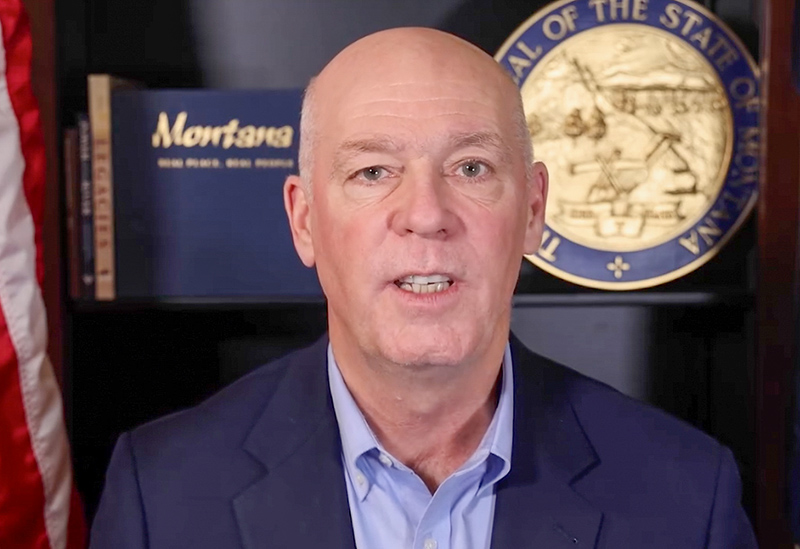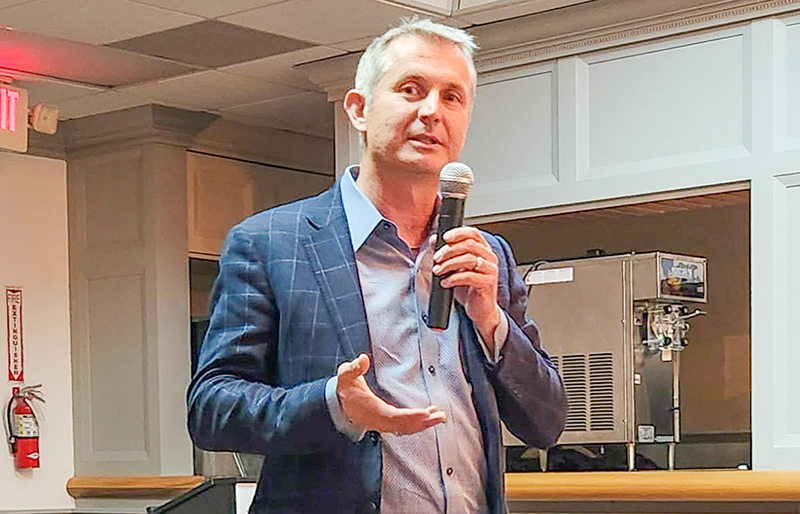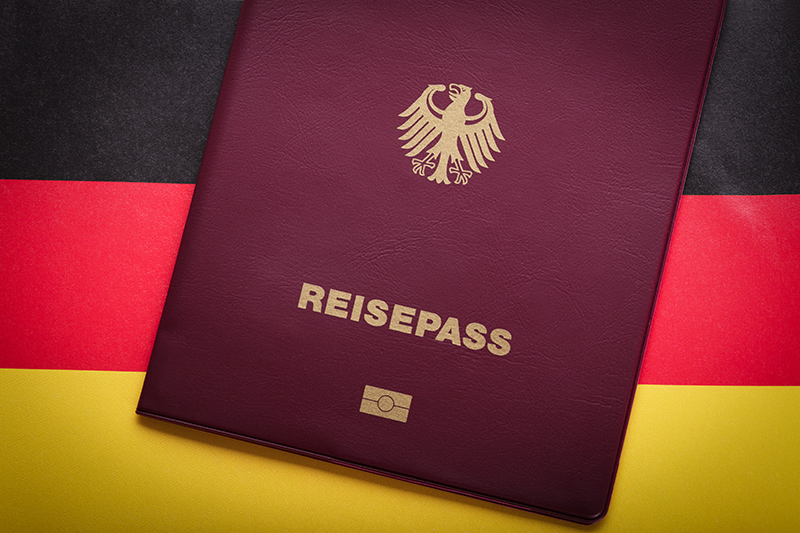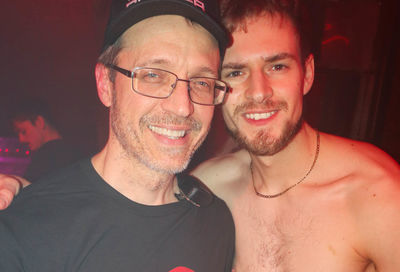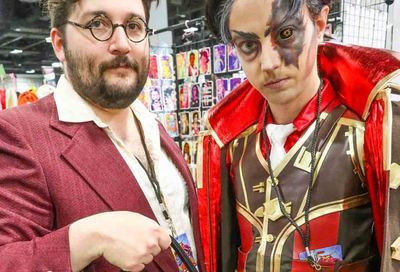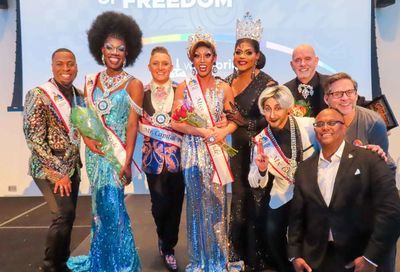Pumped for Pride
RuPaul roars into town to entertain the masses -- and speak her mind
Here’s a tidbit that might surprise you: The person RuPaul admires most is…
Judge Judy.
“I love her!” exclaims the performer who skyrocketed to national fame in the ’90s and whose soaring career continues to defy both convention and expectations. “Her tenacity, her intelligence, to watch her do what she does is like watching magic. I watch her show every single day. There’s no other show that I think of as appointment viewing.”

RuPaul
(Photo by Mathu Andersen)
RuPaul would no doubt hope her GLBT fans will continue to make her latest television endeavor, the reality competition RuPaul’s Drag Race, appointment viewing. The second season begins filming in July and debuts on Logo next January. Until then, fans can get their RuPaul fix through her newest dance album, Champion.
Born RuPaul Andre Charles in California on Nov. 17, 1960, the performer credits both the guidance of the universe — “I am a spiritual being” is a constant refrain during an hour-long phone conversation — and a strong-willed mother for his eventual success.
“My mother was a very rebellious, question authority-type person, and she instilled in me ‘Don’t let other people’s opinion stop you from doing whatever you wanted to do as long as you don’t hurt anybody.'”
According to RuPaul, Ernestine Charles always knew her 6’7″ son would be a star — though she probably didn’t expect the star to go supernova as a result of well-coiffed wigs, designer gowns and six-inch heels. Then again…
“She’d catch me with all her makeup on and get mad,” RuPaul recalls. “She wasn’t mad that I was playing with girl’s stuff. Not at all. She was mad I was wasting her good makeup.”
RuPaul’s mother passed away 16 years ago, but the performer is certain she would be proud of her son-turned-drag-icon.
”I think she’d say, ‘Right on, Ru, right on! Give ’em fuckin’ hell, baby! You rock!'” says RuPaul. “She’d love that I fuck with people’s heads and that I do it with love and in a way that isn’t nasty. She’d love my irreverence.”
That irreverence is the fuel that still powers RuPaul’s outrageous ship. Yet, beneath the makeup, beneath the glamour, lies a quiet, unassuming man who is at once kind and soft-spoken, opinionated and fiercely intelligent, comfortable not only with the persona he has created but with the path the universe has set him on.
“The truth is we are all spiritual beings having a human experience,” says RuPaul, who will appear on Friday night at Town and again on Sunday at the Capital Pride Festival. “Some people take the human experience very seriously and really get into character. It’s as though Earth were a stage play and we were all playing a character. When the show is over, we go and get booked in another show and do another character.”
Welcome to RuPaul’s universe.
METRO WEEKLY: In researching you, one of the things that I found interesting was that RuPaul is actually your given name. It’s as though you were provided a stage name at birth.
RUPAUL: Even before I was born, my mother had predicted I would become famous. She was the one who named me that.
MW: So your mother saw star power in you from the very beginning.
RUPAUL: Yes, she knew it. She was intuitive enough to know what my energy was going to be. I was intuitive enough to follow that energy and go, ”You know what? I know exactly what I need to do.” I knew I’d be famous, I knew I’d love show business. I love creating things and performing. I didn’t know it would be drag, but the universe’s stage direction let me know this was going to be a way for me to break through — and, by God, that’s exactly what happened. I was clear enough to hear the stage direction from the universe. And even contrary to our culture’s ideas of what you can or cannot do in show business, I did it anyway. I did the drag thing even though history had said, ”Well, you can’t do that.” I trusted in my instincts and it was dead on.
MW: But what was the defining moment for you to say, ”Okay, I’m going to make this leap into drag?”
RUPAUL: I was always someone who was not afraid to use all the colors in the crayon box. I’d always experimented with clothes and stuff. [Drag] was just a way to get attention, a way to shock people, with never a desire that I wanted to be a girl or anything like that. It was more costuming, more show. [In the early 1990s], I decided to turn the volume up to 30. It was like the universe said ”Open Sesame.” Everything opened up.
MW: Could you have imagined that your persona would become as big as she did?
RUPAUL: Yes. In fact I thought it would happen earlier than it did. I know that sounds very egotistical, but it’s not. It has nothing to do with me, my ego. It has to do with my spirit knowing what I am, what I can do.
In show business you have to have a certain bravado, a certain confidence. But with that comes insecurity. It comes as a pair. It’s the duality of this material world. You have to have night and day, spirit and ego, male and female. This material world is built on that. In fact, for a spiritual being to have an experience, you have to have a polar opposite, both positive and negative — and I have both. The key is learning how to manage them and to navigate both the confidence and the doubt.
MW: Do you ever think about what your career would have been like had you not pursued drag?
RUPAUL: What drag has taught me is that we are all in drag. You are born naked and the rest is drag. I know what you mean — you mean dressing in feminine [garb]. But for me, I don’t differentiate from what I’m wearing now, which is some slacks and a T-shirt, than from what drag is. It’s just a different type of drag. Most people want to differentiate between the two. Our culture is wrapped up in “us against them,” in what makes us different from one another, but the truth is we’re not different from one another, we’re not separate from one another. We are actually one thing. Now that’s an abstract concept and most people can’t get with that, but the truth is, there is no separation, there is no boy/girl, there is no separation in what’s drag and what’s not drag. It’s all drag. So could I have done it without the female drag thing? You know, I don’t know.
MW: What’s the difference between RuPaul the drag persona and RuPaul the man?
RUPAUL: I’ll tell you difference. When I’m on onstage performing, I am emanating an energy in the direction of the audience. When I’m offstage, the currency is coming into my direction. I’m a natural observer, inquisitive, I love the act of experiencing and then I take that experience and display it and share it when I’m onstage.
MW: Our big gay world is adorned with many, many wonderful female illusionists. What do you think elevated your star above the rest?
RUPAUL: I don’t want to sound conceited, but if you ask I will scientifically dissect this. I think there’s a kindness and openness that diffused some of the fear people had surrounding drag. People have always thought of drag as being something subversive and sexual. And honestly, my energy isn’t overly sexualized. It’s pretty non-threatening. And I think that allowed people — I’m talking Betty and Joe Beer Can — to get on board without feeling threatened by sexuality. In our puritanical culture, sexuality really scares people. That’s why someone like Tom Cruise can become a sex symbol, because he is actually pretty sexless. He doesn’t threaten anyone in a sexual manner, whereas someone like Clive Owen smolders — it makes you feel uncomfortable sometimes. He is really cookin’ something up down in the boiler.
MW: One thing I’ve noticed is how beautiful you have become over the years. You look at some of the earlier photographs and it’s sort of wild and outlandish. There’s this gradual migration to illustrious beauty that’s fundamentally classic. Was that an organic or deliberate evolution?
RUPAUL: It has evolved in that I have taken away some of the gimmicks and allowed my true essence to shine through. I have, as an artist, allowed [my persona] to do its own thing and evolve.
MW: Do you consider your persona of RuPaul a work of art?
RUPAUL: I don’t know if I would say those words. I do think of my material world as a construct. And as a construct you look at the whole thing as a finished piece or as an evolving piece of art. I think that’s important to do. Even if you’re not in show business, I think it’s important to see that.
MW: How is RuPaul’s Drag Race going? Are you enjoying it?
RUPAUL: Oh, God, I love it so much. I’m doing it with these friends of mine whom I met in 1985 and whom I have a blast with. We have the same sense of humor. These are the same people that I did the talk show on VH1 with — Randy Barbato and Fenton Bailey [The Eyes of Tammy Faye, Party Monster] whom I have worked with since 1985. They’re kids from the East Village whom I met here in New York.

RuPaul
(Photo by Mathu Andersen)
MW: Take us behind the scenes. What’s the process like?
RUPAUL: We start with conceptualizing the challenges. What we want the girls to do, what challenges they could go through that really show who they are and what they’re made of. Drag queens are resilient and courageous and crazily creative, and they have to create this illusion and put on shows with very little resources, so we usually look no further than the things I’ve done in my own career.
We pattern these challenges with an underlying psychological litmus test. On the surface, one challenge may be as simple as reading a TelePrompTer or interviewing a celebrity guest, but what we’re really testing is how a girl can think quickly on her feet and what her knowledge of pop culture is. Because a lot of people who grow up to be drag queens were little boys who spent a lot of time by themselves, reading books and magazines and looking at our culture at large as a construct and dissecting it, to really have fun with [culture]. Those are the challenges.
MW: What qualities are you looking for when you cast it?
RUPAUL: Really unique professional performers who pop onscreen but have a story, and who cover a range of what drag is, the different styles of drag.
MW: Were you surprised by who ended up winning Season 1?
RUPAUL: I wasn’t surprised — all of the girls were chosen because they had the potential to win. In fact, they all won because they were chosen. There’s only nine out literally thousands of applicants. A lot of times on these shows, it’s not the winner who the audience remembers or falls in love with. In competition, in life, in everything, it’s not always the goal or the brass ring that is what gets you the No. 1 spot. What gets you the spot in people’s hearts is who you are. Each of the girls got to show that.
The thing that surprised me most was that I was so emotionally invested in these people that I had known for only a short amount of time. Through the audition process and seeing them on tape and then getting to know them in the studio in such an intense, short amount of time, it surprised me that I became so emotionally involved with them. It really hurt me each time one got eliminated. I didn’t budget in the emotional loss I felt.
MW: Did you have any concerns going into the show?
RUPAUL: Over the years other people have tried to pitch me doing a show like this, but I didn’t want to do it because I couldn’t guarantee that people wouldn’t succumb to the old gag of making fun of men in drag. I didn’t want to do that kind of show and I won’t do that kind of show. It had to be respectful. Our culture has a history of making men who are feminine into villains. Look no further than Disney movies or any cartoon — other than Bugs Bunny — where feminized male figures are made to be villains.
MW: You’re coming to Washington to be part of Capital Pride Festival on Sunday, but are appearing at the nightclub Town first on Friday. Talk a bit about the gay nightclub experience as you’ve seen it change over the years.
RUPAUL: I started in clubs many, many years ago. Back then it wasn’t necessarily just gay clubs, it was about places where the Bohemian aesthetic was enjoyed and applauded. What you would get was not just gay people but you would get people uptown, downtown, black, white, gay, straight, it didn’t matter. It was people who were free thinkers, people who didn’t take our culture at face value, who were in on the joke.
When fear in a culture becomes the sort of religion, people decide to polarize and separate and get more specific and want to narrow it down. And that’s what’s happened over the years — you don’t get a club where it’s everybody mixed together. You get specialized, separated lounges that are smaller. That’s why there aren’t so many mega-clubs anymore. You couldn’t get all these people together anymore. And that’s been the major change. Here in New York there are no big clubs anymore.
MW: Well, nightclubs seem to be making a resurgence in our city. What will you be performing at Town?
RUPAUL: My nightclub act. I always have a great time doing it. And the fact that I can still do it and people still want to hire me, trust me, I am so grateful for that.
MW: On Sunday, you’ll close the festival on the Mainstage as the headliner. What makes you most proud about where our movement is at this point in time? What gives you pride?
RUPAUL: I love the fact that the young kids are really breaking down the walls and making sure that shame is eliminated. The reason we have to have pride is because there’s so much shame inherent in following your heart. And religion and politics and culture all instill this shame in us. The young people I know, there’s very little shame in their game. That makes me feel very optimistic about the future.
MW: Bit by bit, state by state, we’re breaking down the barriers to gay marriage. Did you ever think in your lifetime you would see that?
RUPAUL: Absolutely!
MW: Then you’re more optimistic than me.
RUPAUL: I think it’s the right thing to do because the other argument is so ridiculous. I have to have faith that people will come to their senses. And they will really recognize what’s behind their discrimination is fear. There are only two emotions on this planet — love and fear. It’s not love and hate, it’s love and fear. And hopefully, we can uncover fear and reveal fear for what it is. So no, I’m not surprised. There will be more things to be surprised about. We’re amazing people. We can do so much.
MW: What do you think about our new president?
RUPAUL: Love, love, love. Talk about in our lifetimes. To have someone who is actually intelligent as leader of the free world — someone who is not just intelligent but really brilliant, really smart and intuitive…. You look in his eyes and you sense there’s a human being there, not just some puppet placed there by corporations.
After such a long, hostage-like situation, we really did ourselves a favor [by electing Obama]. We needed to repair ourselves. When the blistering drought scorches the earth’s surface, it has to cover itself with clouds to do a repair job. And that’s what we’re doing here. Hopefully it will happen in lots of other areas, marriage equality and human rights. Forget gay rights — it boils down to human rights and how kind are we going to be to ourselves. We’re talking about our own rights. For each human on this planet, it gets down to when are you going to accept all the elements of who you are? Because each person you look at represents a part of yourself. If you’re going to hate on someone, you’re really hating on yourself, literally. Stop hating yourself.
MW: So do you love yourself better as RuPaul the person or RuPaul the persona?
RUPAUL: I do love Ru — the one I wake up with every morning. Who I am onstage, that’s even more of an abstract idea of myself on this planet. But I don’t differentiate. One is a heightened experience of color onstage, the other is the man I wake up with every morning, and loving him in a world that is kind of strange sometimes is an everyday challenge. There’s a certain judgment that we are all under, and it’s hard to stay centered in a world that tells you that you’re not really clean unless you’re Zestfully clean, a consumer world where you’re taught that you have to have material things to have value. That’s a challenge. So my challenge is to love me whether I have designer things or absolute luxury items or not. My life on this planet has taught me to not take anything seriously. My 10th-grade teacher told me that. He said, ”Ru, don’t take life so seriously.” It’s an ongoing struggle to not take it so seriously.
MW: Are you religious?
RUPAUL: Hell to the no.
MW: Earlier, you mentioned the universe as a guiding force. So, final question: Do you believe in God?
RUPAUL: The words in our language are so limited in how we can express things that are real. We have one word for love. I love Butterfingers and I love my sisters. Kind of weird because it doesn’t express different levels of love. The same is true for what God is. God is the word we use for that thing that can’t be explained. So do I believe in that thing that cannot be explained? I believe that there is a force that I’m a part of and that’s it. But you know, this fairy tale that we collectively believe in, I don’t even want to get involved in.
When people interview me, they say, ”Should I call you he or should I call you she?” And I go, ”What?” That’s so not what I’m about because they want me to continue the storyline of this fairy tale. If you stay pliable and open, you will have a more joyous experience. If you don’t sort of key in on certain rules, you can actually expand. You don’t get locked into he, she, God and then there was Adam and Eve. You know what? Throw that out and go with what you feel. I feel there’s something and that’s all you need to know.
MW: Well, while each of us has components of each gender, we are, biologically speaking, gender specific.
RUPAUL: We choose that, because of the duality, because of the polar option in the material world, we have that extreme and somewhere in the middle we find an experience. For us to have a language of experience, we have to have night and day.
MW: But still, I have a penis, so I’m defined as a male in that regard. Are you saying that’s wrong?
RUPAUL: There’s no wrong to it. But you have a no-no hole, too, which also makes you a lady.
RuPaul will appear Friday, June 12, at Town Danceboutique, 2009 Eighth St. NW. Advance tickets are $20 and available online at www.groovetickets.com. For more details, see the Friday listing in our Nightlife section. Call 202-234-TOWN or visit www.towndc.com.
RuPaul will also headline on the Mainstage at the Capital Pride Festival on Sunday, June 14. For more information, pick up a copy of the Capital Pride Guide, available free wherever you pick up Metro Weekly, and online at www.metroweekly.com/prideguide. Or visit www.capitalpride.org.
Support Metro Weekly’s Journalism
These are challenging times for news organizations. And yet it’s crucial we stay active and provide vital resources and information to both our local readers and the world. So won’t you please take a moment and consider supporting Metro Weekly with a membership? For as little as $5 a month, you can help ensure Metro Weekly magazine and MetroWeekly.com remain free, viable resources as we provide the best, most diverse, culturally-resonant LGBTQ coverage in both the D.C. region and around the world. Memberships come with exclusive perks and discounts, your own personal digital delivery of each week’s magazine (and an archive), access to our Member's Lounge when it launches this fall, and exclusive members-only items like Metro Weekly Membership Mugs and Tote Bags! Check out all our membership levels here and please join us today!




